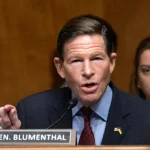

Federal Reserve Chairman Jerome Powell is set to face questions from lawmakers about inflation, the possibility of recession, and much more this week as he makes required semiannual appearances before Congress.
Powell will appear before the Democratic-controlled Senate Banking Committee on Tuesday and the Republican-controlled House Financial Services Committee on Wednesday. The testimony comes exactly two weeks before top officials at the Fed will meet to decide what to do with the central bank’s target interest rate.
The backdrop
The hearings come after a month of disappointing inflation reports, which showed inflation is proving stickier than expected.
The consumer price index for January, which is the most closely watched inflation gauge, showed the annual rate of inflation down only a tenth of a percentage point from the month before. Additionally, inflation measured by the gauge favored by the Fed unexpectedly jumped to 5.4% annually in January. That is up from 5.3% in December. The acceleration jolted markets and added to recessionary fears.
CONGRESSIONAL REBUKE AND LOOMING BIDEN VETO CEMENT ESG AS MAJOR POLITICAL CONFLICT
The bad inflation news has put renewed pressure on Powell and the Fed to act more aggressively with monetary policy. The last time the Fed met was at the start of February, and officials opted for a more dovish rate increase of just a quarter percentage point. That is after a half percentage point increase in December and a barrage of aggressive three-quarters percentage point revisions before that.
Powell will likely be questioned about how high interest rates might go given the persistent inflation.
On the Left, lawmakers (who are most concerned about the Fed’s full employment mandate) are expected to express concerns that driving up rates too much could crash the country’s strong labor market. On the Right, lawmakers are expected to express support for strong action to rein in inflation, which is rippling through the economy and making life less affordable for constituents.
Tone matters
Powell and other Fed officials are deft at choosing their words carefully. Expect Powell to speak in broad terms during this week’s hearings. For instance, he is not likely to spell out in exact numbers how high he thinks interest rates will go. Instead, he is likely only to hint about his views through tone.
Powell’s speeches are known for moving markets in real time. If his tone appears more hawkish in light of the sticky inflation, the stock market might start tumbling in anticipation of higher borrowing costs for longer. If he seems a bit more dovish, though, it could be an indication that officials are leaning toward another mild quarter percentage point hike rather than a more desperate half percentage point increase this month.
Other Fed officials have hinted at rates rising more than anticipated this year, particularly given there is a bit of a cushion with the tight labor market. The economy added 517,000 jobs in January, shattering expectations, and the unemployment rate is now at 3.4% — the lowest since 1969. Last week, Atlanta Fed President Raphael Bostic appeared open to higher rates given the situation.
“I want to be completely clear: There is a case to be made that we need to go higher,” Bostic told reporters last week. “Jobs have come in stronger than we expected. Inflation is remaining stubborn at elevated levels. Consumer spending is strong. Labor markets remain quite tight.”
But this week, Powell will undoubtedly highlight the importance of balancing the Fed’s dual mandate of healthy inflation and full employment. Thus, it will be important to gauge the nuance of the chairman’s words and the tone that he uses when answering questions from lawmakers.
Greg Mesack, senior vice president of government affairs at the National Association of Federally-Insured Credit Unions, said during a Monday call with reporters that his group is keen to see how Powell strikes a balance between insulating the economy from a recession while still meaningfully slashing inflation.
“We will be watching … where he sees things moving on interest rates and economic growth — is a soft landing feasible? Is it possible? Do we have the ability to raise rates to tamp down inflation? Because a recession is certainly worrisome, but rapid inflation is also worrisome,” Mesack said when asked by the Washington Examiner.
What won’t be said
There are some things that Powell will refuse to say, namely how much he thinks interest rates will rise this year before peaking. That is because the central bank’s moves are dictated by a bevy of closely watched reports. The next Federal Open Market Committee meeting is set for March 21-22.
The hearings this week happen on Tuesday and Wednesday, meaning they precede the February employment report that will be released on Friday morning. That report will factor heavily into the Fed’s moves. A sudden rise in unemployment or a generally weak report would show the rising rates are beginning to eat into the labor market, but another gangbusters report could cause the Fed to lean toward more aggressive rate revisions.
It will also not be possible for Powell to be questioned on this week’s new job numbers because the Fed will enter into a nearly two-week media blackout period preceding the FOMC meeting — further increasing the intrigue of this week’s testimony.
CLICK HERE TO READ MORE FROM THE WASHINGTON EXAMINER
Investors are now pegging the odds of a quarter percentage point hike at about 69%, according to CME Group’s FedWatch tool, which calculates the probability using futures contract prices for rates in the short-term market targeted by the Fed.
More than 30% now think that the Fed will hike rates by a half percentage point given the recent reports. It is worth watching to see how those numbers change in the next two days to get a sense of how investors interpreted Powell’s testimony.






